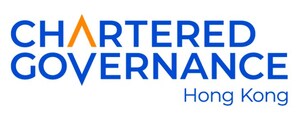HONG KONG, June 25, 2024 /PRNewswire/ -- The Hong Kong Chartered Governance Institute (HKCGI) (Institute) has released a survey report titled 'A Sustainability Governance Issue: Retirement Age & A Managed Process', drawing insights from approximately 1,300 respondents. The Hong Kong Census and Statistics Department forecasts a significant increase of around 90% in Hong Kong's senior population from 1.45 million to 2.74 million by 2047. The world's population is likewise ageing as people live longer and healthier.
Based on respondents' views, the report advocates for 65 and beyond (or 65+) as the preferred retirement age for Hong Kong organisations. That is, organisations could set a retirement age of 65 in line with the civil service and, depending on organisational needs, adopt a managed process for open and transparent discussions around one year before retirement for post-retirement full- or part-time extensions on mutually agreeable terms. Organisations will not take on additional risks as they can replace underperformers.
Key Findings and Recommendations
Retirement is a Sustainable Governance Issue. Under the United Nations Sustainable Development Goal 8, Hong Kong should promote full and productive employment for all, including senior workers. At the corporate governance level, succession planning requires a balance between retaining experienced employees and effectively integrating new talent.
Ms Edith Shih FCG(CS, CGP) HKFCG(CS, CGP)(PE), Honorary Adviser to Institute Council, Past International President, The Chartered Governance Institute and Institute Past President, as well as Executive Director and Company Secretary, CK Hutchison Holdings Limited, noted that: "As an executive of a multinational conglomerate with operations worldwide, and recognising the world population is ageing healthily, it is inevitable, because of the demography, that economies and organisations need to retain senior employees for sustainability of their economies and business operations respectively."
Mr David Simmonds FCG HKFCG, Institute President; Chief Strategy, Sustainability & Governance Officer, CLP Holdings Limited, agreed and added, "From the strategic business perspective, simply retiring employees because of their birth-day, that is reducing it to a number, is no longer sustainable. Rather, a more careful assessment of their contributions is required as part of succession planning."
Retirement Age of 65+. The survey results indicate a strong preference for allowing employees to work as long as they are capable, with 65 as the recommended retirement age, in line with the civil service, if one is needed (collectively 57% of the respondents). As noted above, organisations could adopt a retirement age of 65 and allow for a managed process for open and transparent discussions commencing around a year, or as the organisations deem fit, before scheduled retirement for post-retirement retention beyond 65.
Ms Shih added, "In some countries, forced retirement at a certain age is prohibited due to statutory provisions or anti-age discrimination laws, including the U.K., Canada, Australia, New Zealand, and the U.S. We function well in those economies. We also have no issue with a retirement age in some economies where it serves as a reset for considering the employment relationship with possible post-retirement extensions."
Mr Simmonds added, "It has been an easy solution to retire employees when they reach a certain age, but a holistic assessment of the employee's ongoing contribution will align more with business strategy and sustainable governance."
Enhanced Public-Private Partnership. The report also underscores the role of the HKSAR Government in enhancing programs to upskill employees for post-retirement roles, mirroring successful models such as Singapore's, which includes tax incentives and subsidies for ongoing education.
Click HERE to download the report.
About The Hong Kong Chartered Governance Institute
(Incorporated in Hong Kong with limited liability by guarantee)
The Hong Kong Chartered Governance Institute (HKCGI), formerly known as The Hong Kong Institute of Chartered Secretaries (HKICS), is the only qualifying institution in the Chinese mainland and Hong Kong for the internationally recognised Chartered Secretary and Chartered Governance Professional qualifications.
With over 75 years of history and as the Hong Kong/China Division of The Chartered Governance Institute (CGI), the Institute's reach and professional recognition extends to all of CGI's nine divisions, with about 40,000 members and students worldwide. HKCGI is one of the fastest growing divisions of CGI, having over 10,000 members, graduates and students with significant representations within listed companies and other cross-industry governance functions.
Believing that better governance leading to better decisions for a better world, HKCGI's mission is to advance governance in commerce, industry, and public affairs through education, thought leadership, advocacy, and engagement with members and the broader community. As recognised thought leaders in our field, the Institute educates and advocates for the highest standards in governance and promotes an expansive approach that considers all stakeholders' interests.
Better Governance. Better Future.
For more information, please visit www.hkcgi.org.hk.
HKCGI Disclaimer |
Notwithstanding the contents, this paper is not intended to constitute legal advice or to derogate from the responsibility of any person to comply with the relevant rules and regulations. Readers should be aware that this paper is for reference only and should form their own opinions on each case. In case of doubt, they should consult their own legal or professional advisers as they deem appropriate. The views expressed herein do not necessarily represent those of the Institute. It is also not intended to be exhaustive but to guide understanding of the topic. The Institute shall not be responsible to any person or organisation because of reliance upon any information or viewpoint set forth under this paper, including any losses or adverse consequences. The Institute owns the copyright of this paper. This paper is intended for public dissemination, and any reference to it or reproduction in whole or part thereof should be suitably acknowledged.
|
© 2024 The Hong Kong Chartered Governance Institute. All rights reserved. |
SOURCE The Hong Kong Chartered Governance Institute





Share this article